The Rosenthal Prize
for Innovation and Inspiration in Math Teaching
Designed to recognize and promote hands-on math teaching in upper elementary and middle school classrooms, the Rosenthal Prize carries a cash award of $25,000 for the single best activity, plus up to five additional monetary awards for other innovative activities. The winning teacher(s) will have the opportunity to share their activities with educators around the world.
The application window for the 2024 Rosenthal Prize is now open.
Applicants selected for the final round will be notified via email in summer of 2024.
The application submission window will close on Wednesday, May 15.
_____________
Congratulations to the 2023 Rosenthal Prize winners!
Congratulations to Karl Schaffer, first place winner of the 2023 Rosenthal Prize for Innovation and Inspiration in Math Teaching for his lesson, How is a Polygon Like a Circle? Karl’s winning lesson is an arts-integrated activity that teaches students about geometry using full-body exploration. In this creative and playful discovery lesson, students work in teams and walk along the edges of a shape marked on the ground, using movement to explore mathematical concepts. Karl lives in Scotts Valley, CA., and was awarded a $25,000 cash prize.
Kathy Paur, who lives in Burlingame, CA, was awarded second place for her lesson, Cutting Out Hearts. Kathy’s lesson teaches concepts of symmetry through a sequence of puzzles in which students fold paper in increasingly complex ways in order to use a single curve cut to create a pattern of heart-shaped holes in their paper. Students learn about symmetry and problem-solving through reverse engineering, flexible thinking, and persistence. Kathy was awarded a $12,500 cash prize.
_____________
Check out the Rosenthal Prize’s sister program:
The 2024 Rosenthal Prize Summer Institute
Wednesday, July 10 through Friday, July 12
Teachers, want to learn how to deliver past prize-winning lessons in your own communities? If selected for the program, participants will receive an expenses-paid trip to New York City for one week of professional development in the summer.
_____________
Winning Lesson Plans
_____________
2022 Rosenthal Prize winners

This year’s first place winner, Nancy Seeds, hails from Greenwich, CT. Her winning lesson, Divisibility UNO®, teaches students to be confident problem-solvers by exploiting the relationship between number patterns and divisibility. The game involves students using a five-card hand of UNO® cards to create a valid large number. Each game round requires students to use higher-order thinking, activating both analytic and creative processes.
Dan Finkel, who currently lives and works in Seattle, WA, the founder of math game and curriculum company Math for Love, was awarded second place for his lesson, The Billiard Ball Problem. His lesson explores the geometry of reflections by teaching students to observe the patterns a ball makes when it is shot diagonally from a corner of a rectangular table to predict what corner the ball will end up in.
Third place winner Steve Stein of Brooklyn, NY, was recognized for his lesson Transformation Sumo: A Geometry Game, which was inspired by the connection between strategic card games and mathematical functions called transformations. The two-player game requires students to think strategically about how to play a combination of cards that would remove a chip from a gameboard. The lesson teaches students how to perform transformations and also introduces ideas related to group theory.
Shefali Nanavati of Oakland, CA, received an honorable mention for her lesson, Journey to Trilandia: Exploring Base-3 Number System. This interactive lesson has students visualize a far-away land called Trilandia that has a Base-3 number system. Each “visitor” to Trilandia is given three different colored coins that represent place value. Students roll a die to determine a trade, which they make by going to the “bank” to trade coins. The game can be used to teach different concepts such as number systems, exponents, place value and algebraic reasoning.
_____________
2021 Rosenthal Prize winners
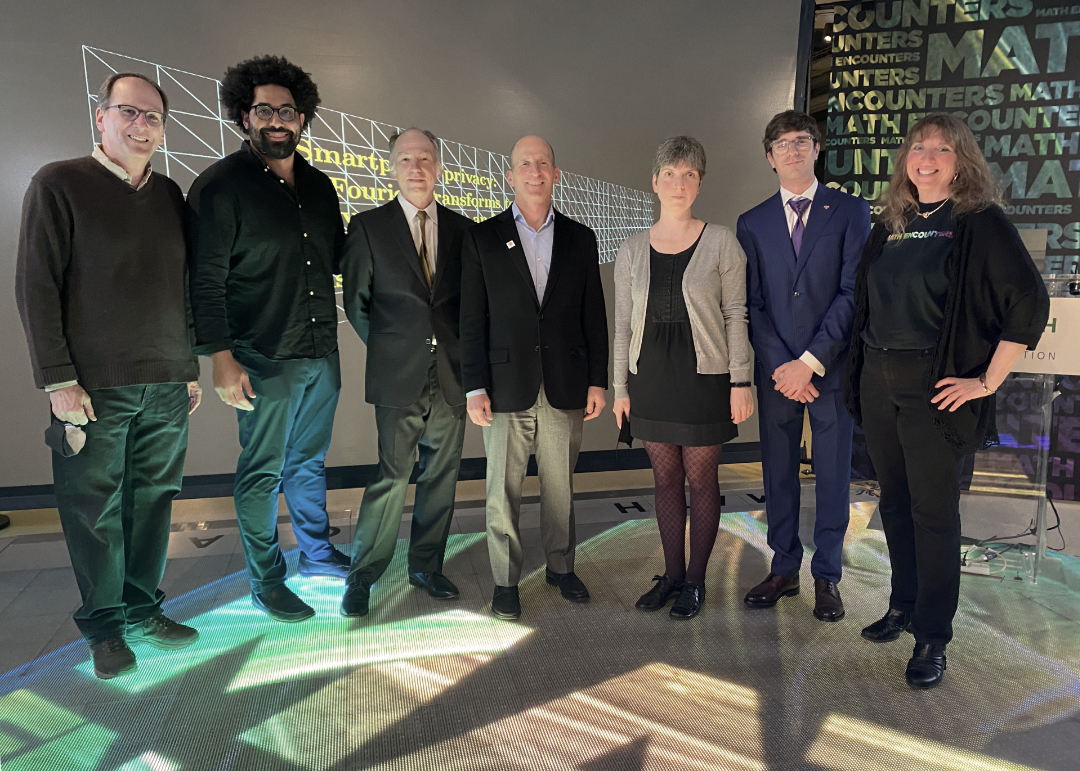
Congratulations to Chaim Goodman-Strauss, first place winner of the 2021 Rosenthal Prize for Innovation and Inspiration in Math Teaching for his lesson on symmetry, Tooti Tooti (2222). Chaim’s winning lesson teaches students about symmetry by crafting handmade “tiles” with four different points of two-fold rotational symmetry (i.e., the patterns remain the same as you rotate them 180 degrees) and piecing the tiles together into patterns that can fill an infinite space, similar to wallpaper patterns. Chaim is a professor of mathematics at the University of Arkansas, and he was awarded a $25,000 cash prize.
David Caliri, who currently lives in Tbilisi, Georgia, and works for a Boston-based organization that grew out of the MIT Media Lab, was awarded second place for his lesson, Binary Coins Are Better Than Bitcoin! His interactive lesson allows students to learn about the binary number system by pretending to be business owners and creating their own currency to make exact change for product sales. David was awarded a $10,000 cash prize.
Third place winner Elena Pavelescu, Associate Professor in the Mathematics and Statistics Department at the University of South Alabama in Mobile, AL, was recognized for her lesson, The Game of Cats: A mathematical logic activity, which teaches students logic by asking them to interpret AND and OR statements. Elena was awarded a $2,500 cash prize.
Ryan Smith of Lake Worth, FL received an honorable mention for his lesson, Astronaut Explorer: A Measurement Conversion Conundrum, which allows students to take on the role of astronauts exploring a new planet on which they must learn about the civilization’s measurement system. This activity promotes genuine thinking, decoding, and reasoning, and is designed to help students construct procedures for converting from one unit to another using ratios. Ryan was awarded a $500 cash prize.
_____________
2020 Rosenthal Prize winners

(Bottom from left to right) Saul Rosenthal (Sponsor and MoMath Trustee) and Cindy Lawrence (MoMath Executive Director and CEO)
Congratulations to Doug O’Roark, winner of the 2020 Rosenthal Prize for Innovation and Inspiration in Math Teaching, for his lesson, Towers & Dragons. In Doug’s lesson, students discover a stunning connection between paper folding and a classic disc-moving puzzle. Doug is the Executive Director of Math Circles of Chicago. He was awarded a $25,000 cash prize.
Additional congratulations to the 2020 runner-up, Lauren Siegel, the Director of MathHappens Foundation in Austin, TX, for her lesson, Engagement with Ratio and Proportion: Building a Tool to Deepen Understanding. In Lauren’s lesson, students learn to appreciate ratios by making their own calipers and applying them to objects, photos, and geometric figures. Lauren was awarded a $5,000 cash prize.
_____________
2019 Rosenthal Prize winners
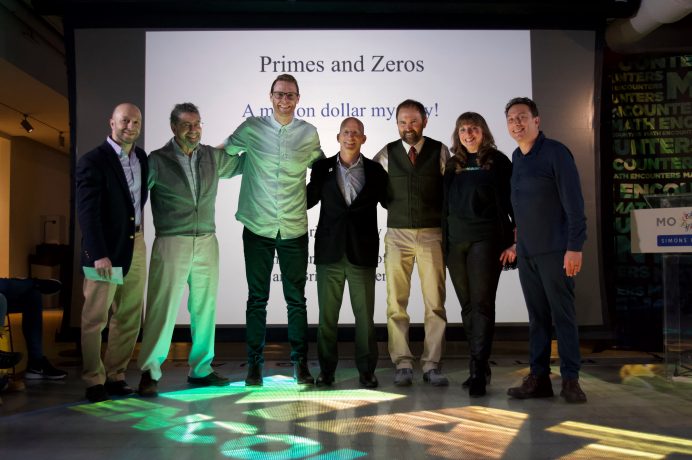
Congratulations to Nat Banting, winner of the 2019 Rosenthal Prize for Innovation and Inspiration in Math Teaching, for his lesson, Dice Auction: Putting Outcomes of the Dice Up for Sale. In Nat’s lesson, students test their intuitive probabilistic reasoning of dice throws with a dynamic outcomes auction. Reality — and mathematics — then provide feedback! Nat is a high school mathematics teacher and a university faculty member in Saskatoon, Saskatchewan, Canada. He was awarded a $25,000 cash prize.
Additional congratulations to the 2019 runner-up, Matt Roscoe, a mathematics professor at the University of Montana in Missoula, Montana, for his lesson, Building the City of Numbers: An Exploration of Unique Prime Factorization. In Matt’s lesson, the prime factorizations of the counting numbers from 2 to 100 come to stunning, three-dimensional life. Matt was awarded a $15,000 cash prize.
_____________
2018 Rosenthal Prize winners
Congratulations to Elizabeth Masslich, winner of the 2018 Rosenthal Prize for Innovation and Inspiration in Math Teaching for her lesson Geometry Project: DARTBOARD. In Elizabeth’s lesson, students learn geometric probability using shapes on a dartboard. Elizabeth is a teacher in the Milwaukee, Wisconsin metro area, and was awarded a $25,000 cash prize.
Additional congratulations to the 2018 first runner-up, Hector Rosario of the Atlanta, Georgia metro area, for his lesson, Squareland: Into How Many Squares Can You Cut a Square?, in which students generate and analyze patterns by cutting squares into smaller squares while making conjectures and trying to prove their claims. Hector was awarded a $5,000 cash prize.
The Museum also wishes to congratulate the 2018 runners-up, Dwaynea (Golden) Griffin (Statistics TriMathlon) of Hinesville, GA, and Kristen Rudd (Searching for Intersections) of Bergen County, NJ, who each received a $1,000 cash prize.
_____________
2017 Rosenthal Prize winners
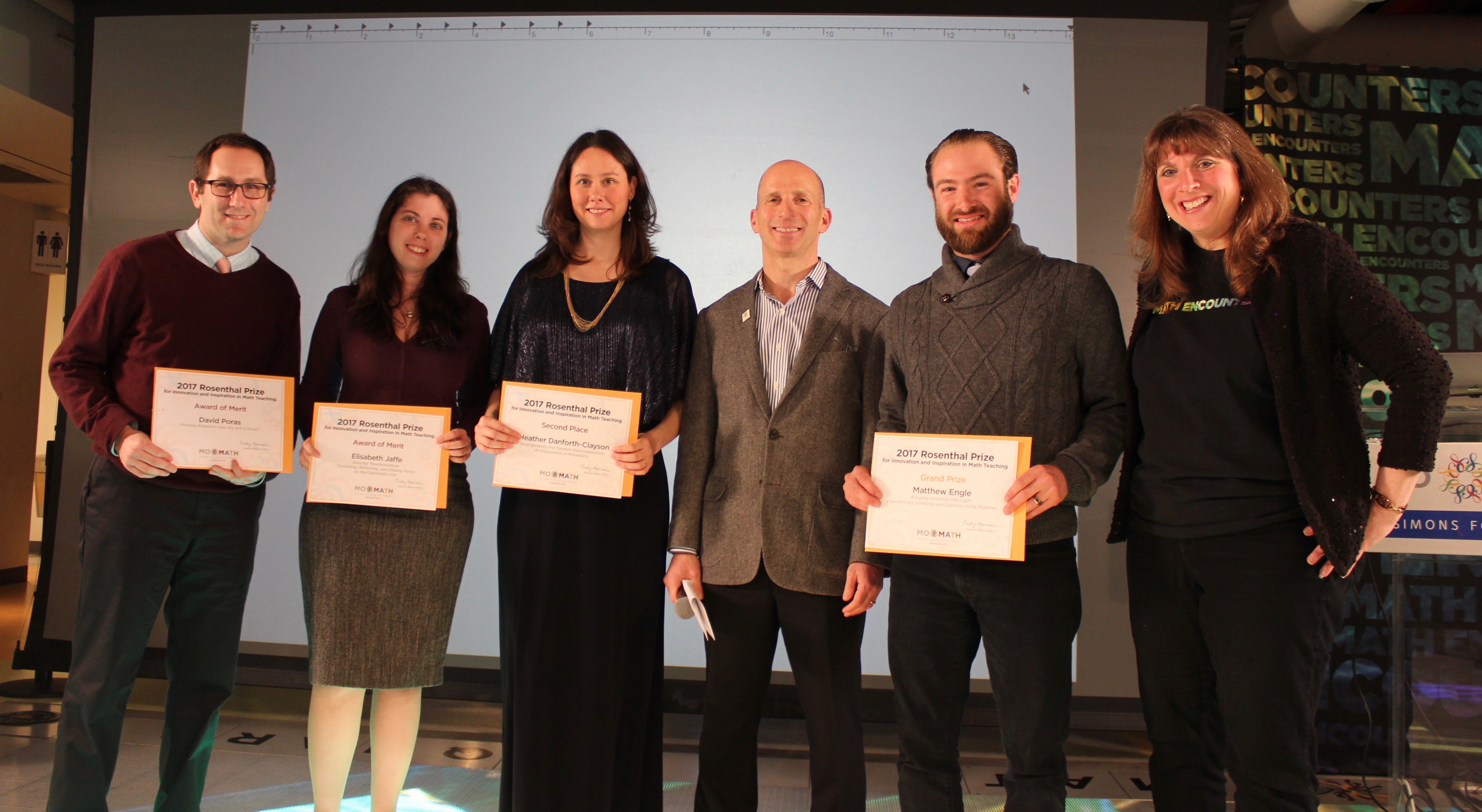
Congratulations to Matt Engle, winner of the 2017 Rosenthal Prize for Innovation and Inspiration in Math Teaching! In Matt’s lesson, students examine the shadows of shapes to explore concepts such as ratio, dilation, and proportionality in triangles. Matt is a teacher at Monterey Bay Academy in La Selva Beach, CA, and was awarded a $25,000 cash prize for his winning lesson, Bringing Similarity Into Light: Experiencing Similarity and Dilations Using Shadows.
Additional congratulations to the 2017 second place winner, Heather Danforth-Clayson of Helios School in Sunnyvale, CA, for her lesson Derangements and Random Rearrangements: An Exploration of Probability. In Heather’s lesson, students explore rearrangements of number sets by conducting hands-on experiments in probability.
The Museum also wishes to congratulate the 2017 runners-up, Elisabeth Jaffe (Dancing Transformations) from Baruch College Campus High School in New York City and David Poras (Growing Alligators) from Weston Middle School in Weston, MA.
_____________
2016 Rosenthal Prize winners
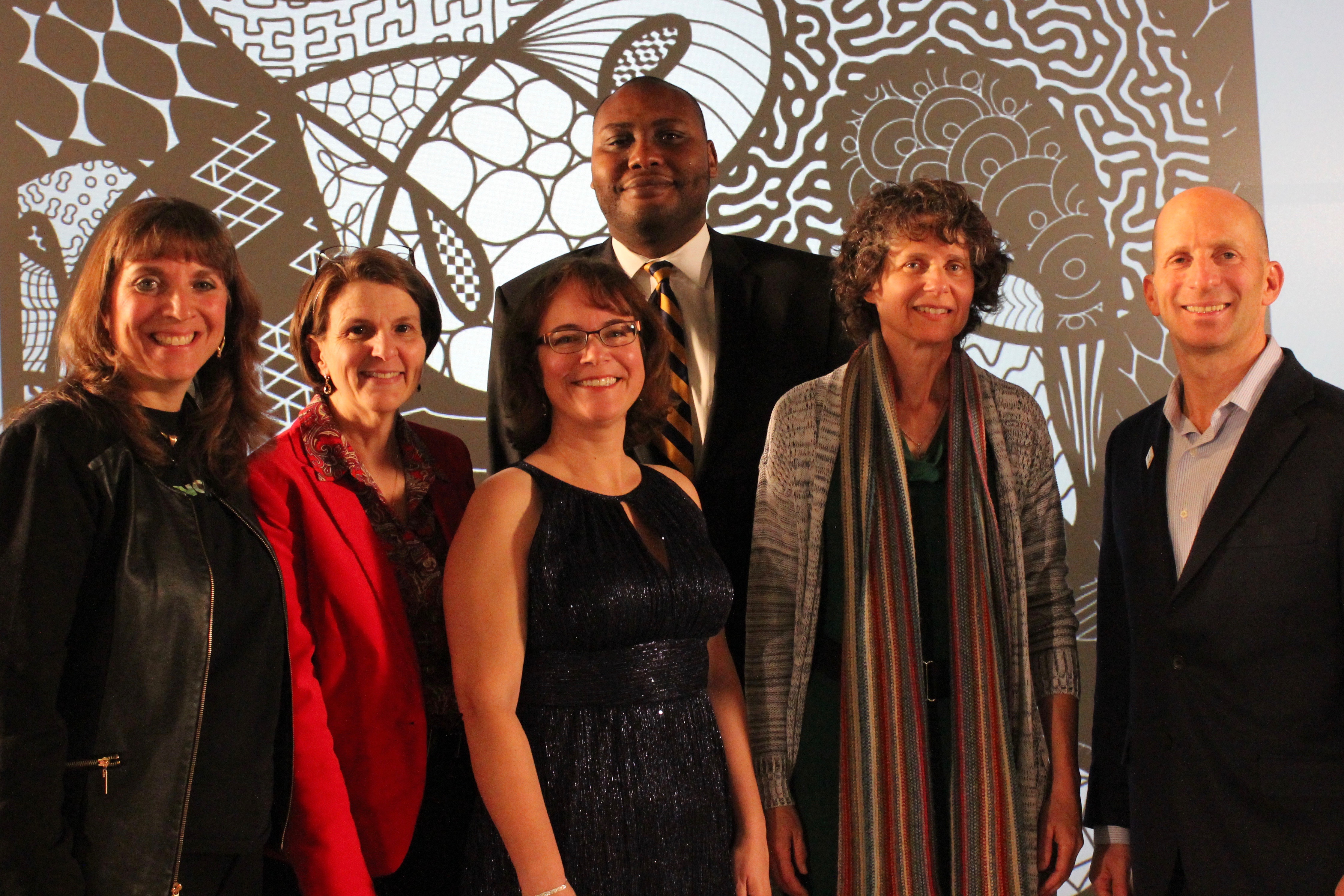
Congratulations to Traci Jackson, winner of the 2016 Rosenthal Prize for Innovation in Math Teaching! In Traci’s lesson, students explore proportional reasoning by mixing colored solutions, creating different color combinations to visualize ratios. Traci is a teacher at Oak Valley Middle School in San Diego, CA, and was awarded a $25,000 cash prize for her winning lesson, Creating Color Combos: Visual Modeling of Equivalent Ratios.
Additional congratulations to the 2016 second place winner, Dena Lordi of Diamond Bar High School in Diamond Bar, CA, for her second-place lesson, Where Can I Find A Weightless Stick? In Dena’s lesson, students trace the changing balance point on a scale as weights are added in order to identify the mean value of a set of numbers.
The Museum also wishes to congratulate the 2016 runners-up Crystal Frommert (Algebra on a Number Line), Jemal Graham (Blacktop Coordinate Plane), and Maria Hernandez (Pass the Candy: A Recursion Activity).
_____________
2015 Rosenthal Prize winners
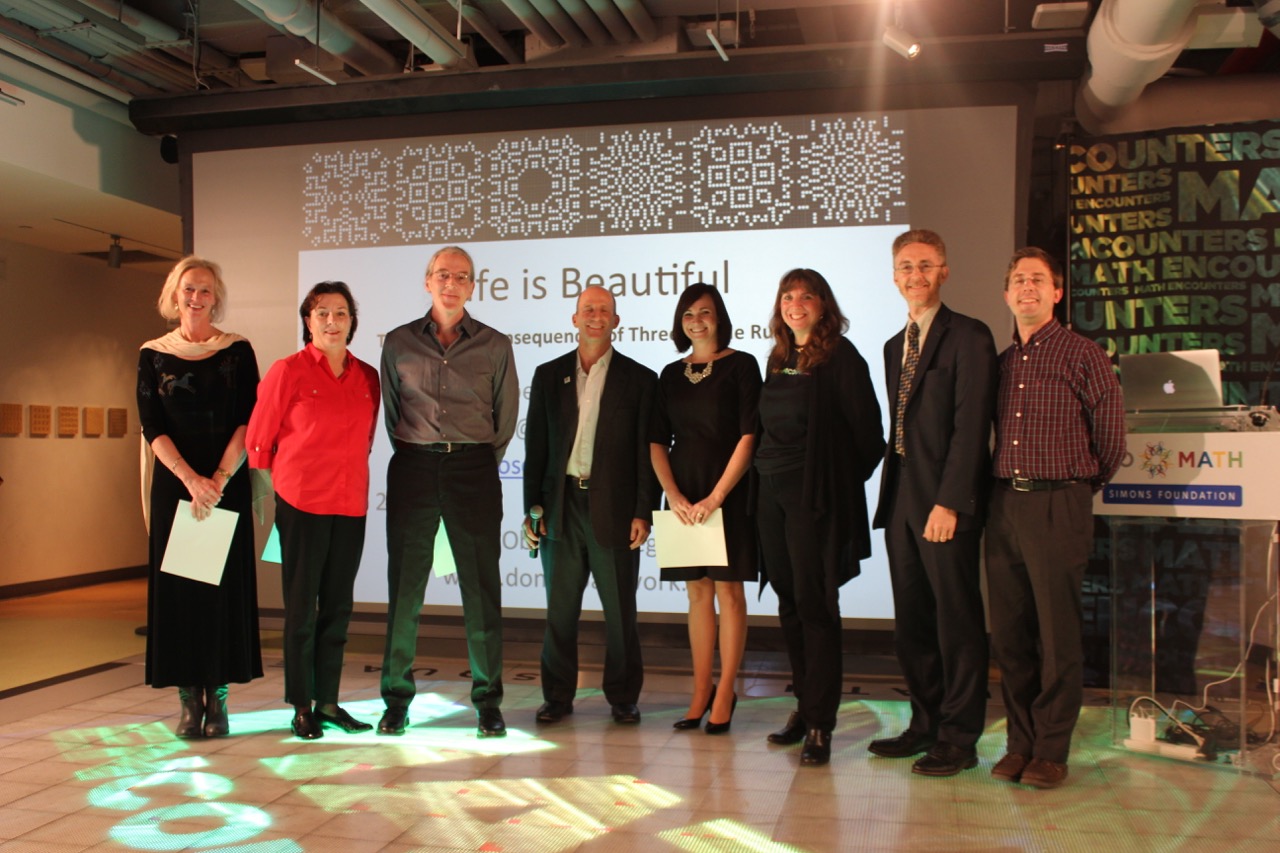
Congratulations to Jillian Young, winner of the 2015 Rosenthal Prize for Innovation in Math Teaching! Jillian created a lesson that helps students learn about surface area and volume using the game Minecraft. Jillian is a teacher at Elwood Kindle Elementary School in Pitman, NJ, and was awarded a $25,000 cash prize for her winning lesson, MUTANT Creature Invasion: Minecraft Volume Investigation.
_____________
2014 Rosenthal Prize Winner
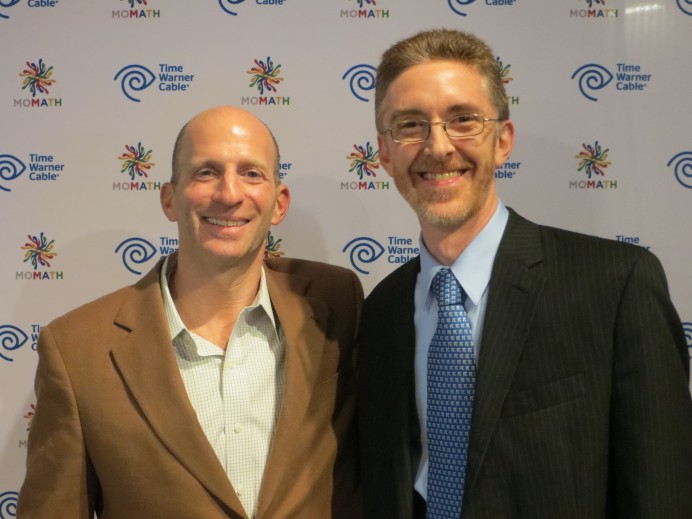
Congratulations to Ralph Pantozzi, winner of the 2014 Rosenthal Prize for Innovation in Math Teaching! Ralph, a teacher at Kent Place School in Summit, NJ, was awarded a $25,000 cash prize for his winning lesson, Random Walk. Watch a short video of the “Random Walk” lesson.
_____________
2013 Rosenthal Prize Winners
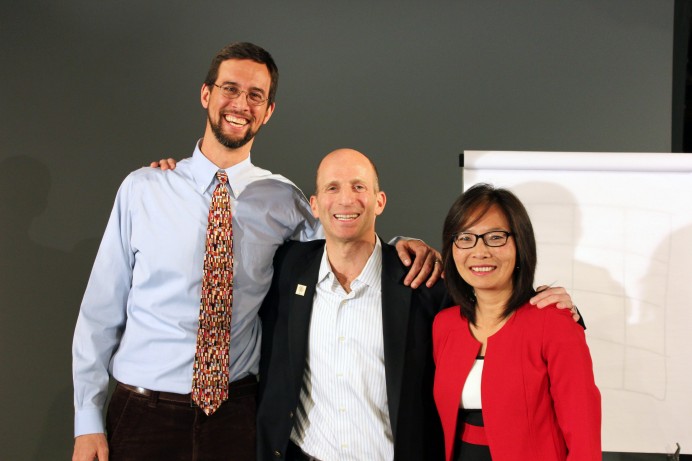
Congratulations to Trang Vu and Brent Ferguson, respectively the winner and runner-up of the 2013 Rosenthal Prize for Innovation in Math Teaching! Trang, a teacher at La Jolla High School in La Jolla, CA, was awarded a $25,000 cash prize for her winning lesson, Mathematics and Fashion Design. Brent, a teacher at The Lawrenceville School in Lawrenceville, NJ, was awarded a $10,000 cash prize for his runner-up lesson, Engineering a Number Line by Construction.
_____________
2012 Rosenthal Prize Winners
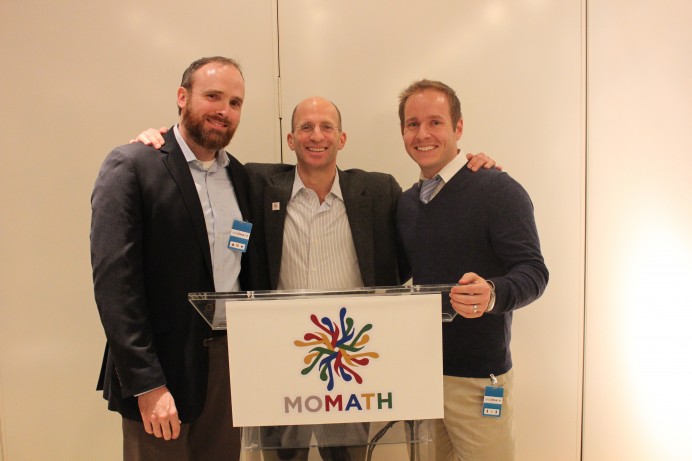
Congratulations to Scott Goldthorp and Patrick Honner, respectively the winner and runner-up of the 2012 Rosenthal Prize for Innovation in Math Teaching! Scott, a teacher at Rosa International Middle School in Cherry Hill, NJ, was awarded a $25,000 cash prize for his winning lesson, Hands-On Data Analysis. Patrick, a teacher at Brooklyn Technical High School in Brooklyn, NY, was awarded a $10,000 cash prize for his runner-up lesson, Sphere Dressing.
_____________
About the Rosenthal Prize for Innovation and Inspiration in Math Teaching
The annual Rosenthal Prize for Innovation and Inspiration in Math Teaching is designed to recognize and promote hands-on math teaching in the upper elementary and middle school classrooms. Each year, the winning teacher is awarded a cash prize of $25,000, and the winning activity is shared with interested teachers around the world.
The Rosenthal Prize for Innovation and Inspiration in Math Teaching has four goals:
- To recognize and reward exceptional 4th through 12th grade teachers around the world who employ innovation(s) appropriate to the upper elementary or middle school classroom.
- To demonstrate to the education profession and the general public that innovative math teaching exists and can successfully reach the middle grades.
- To replicate the successful innovative activity of the winning teacher, distribute it to classrooms across the country, and positively impact math education in the United States and beyond.
- To encourage innovation and incorporation of hands-on methods in classrooms around the world.